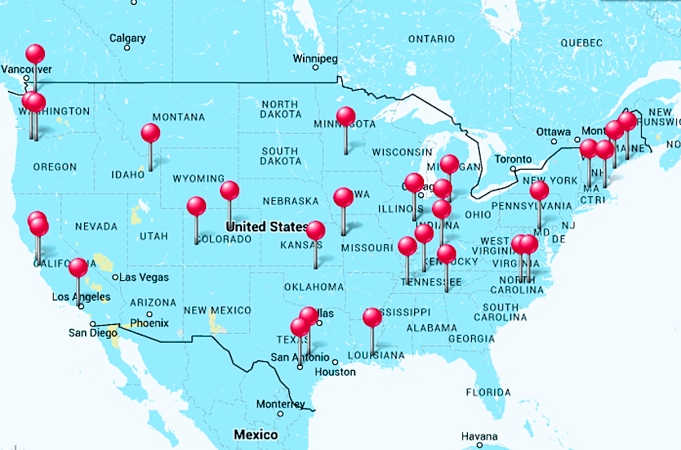
Last week, a coalition of representatives from 32 cities across the U.S. joined together to address the pressing need for fast, reliable and affordable high-speed Internet. Organized by Next Century Cities, the bipartisan initiative is designed to help cities create their own community broadband networks because big telecom companies don’t provide broadband to all areas of the country.
Among the challenges facing city leaders trying to implement community broadband service are cost, infrastructure issues, and the reality that in many places there are laws that prohibit community broadband.
As Jason Koebler, staff writer at Motherboard reports, “Throughout the country, companies like Comcast, Time Warner Cable, CenturyLink, and Verizon have signed agreements with cities that prohibit local governments from becoming internet service providers and prohibit municipalities from selling or leasing their fiber to local startups who would compete with these huge corporations.”
The Next Century Cities coalition will work together to bring competitive, gigabit speed Internet to their cities as a way to create jobs, improve health care and education, offer residents vital infrastructure and attract business.
Two of the member cities, Wilson, North Carolina, and Chattanooga, Tennessee already have gigabit service and Austin, Texas has Google fiber. Their experience will be vital in helping other cities challenge big telecom business for the right to create community broadband.
In a statement, Deb Socia, Executive Director of Next Century Cities said that the mayors are "rolling up their sleeves and getting the job done and that Next Century Cities will be there to support their goals."
“Across the country, city leaders are hungry to deploy high-speed Internet," she says, "to transform their communities and connect residents to better jobs, better health care, and better education for their children."
The plan for Next Century Cities is to “engage with and assist communities in developing and deploying next-generation broadband Internet.” In sharing best practices, information and strategies, participating cities will learn from each other and raise awareness of the fact that high-speed Internet is no longer a luxury, but a necessary utility.
*
Meanwhile, Claire Cain Miller reports for The New York Times why the U.S. has dramatically fallen behind the rest of the world in Internet speed and affordability:
America’s slow and expensive Internet is more than just an annoyance for people trying to watch “Happy Gilmore” on Netflix. Largely a consequence of monopoly providers, the sluggish service could have long-term economic consequences for American competitiveness.
Downloading a high-definition movie takes about seven seconds in Seoul, Hong Kong, Tokyo, Zurich, Bucharest and Paris, and people pay as little as $30 a month for that connection. In Los Angeles, New York and Washington, downloading the same movie takes 1.4 minutes for people with the fastest Internet available, and they pay $300 a month for the privilege, according to The Cost of Connectivity, a report published Thursday by the New America Foundation’s Open Technology Institute.
The report compares Internet access in big American cities with access in Europe and Asia. Some surprising smaller American cities — Chattanooga, Tenn.; Kansas City (in both Kansas and Missouri); Lafayette, La.; and Bristol, Va. — tied for speed with the biggest cities abroad. In each, the high-speed Internet provider is not one of the big cable or phone companies that provide Internet to most of the United States, but a city-run network or start-up service.
The reason the United States lags many countries in both speed and affordability, according to people who study the issue, has nothing to do with technology. Instead, it is an economic policy problem — the lack of competition in the broadband industry.
“It’s just very simple economics,” said Tim Wu, a professor at Columbia Law School who studies antitrust and communications and was an adviser to the Federal Trade Commission. “The average market has one or two serious Internet providers, and they set their prices at monopoly or duopoly pricing.”
For relatively high-speed Internet at 25 megabits per second, 75 percent of homes have one option at most, according to the Federal Communications Commission — usually Comcast, Time Warner, AT&T or Verizon. It’s an issue anyone who has shopped for Internet knows well, and it is even worse for people who live in rural areas. It matters not just for entertainment; an Internet connection is necessary for people to find and perform jobs, and to do new things in areas like medicine and education.
“Stop and let that sink in: Three-quarters of American homes have no competitive choice for the essential infrastructure for 21st-century economics and democracy,” Tom Wheeler, chairman of the F.C.C., said in a speech last month.
The situation arose from this conundrum: Left alone, will companies compete, or is regulation necessary?
In many parts of Europe, the government tries to foster competition by requiring that the companies that own the pipes carrying broadband to people’s homes lease space in their pipes to rival companies. (That policy is based on the work of Jean Tirole, who won the Nobel Prize in economics this month in part for his work on regulation and communications networks.)
In the United States, the Federal Communications Commission in 2002 reclassified high-speed Internet access as an information service, which is unregulated, rather than as telecommunications, which is regulated. Its hope was that Internet providers would compete with one another to provide the best networks. That didn’t happen. The result has been that they have mostly stayed out of one another’s markets.
When New America ranked cities by the average speed of broadband plans priced between $35 and $50 a month, the top three cities, Seoul, Hong Kong and Paris, offered speeds 10 times faster than the United States cities. (In some places, like Seoul, the government subsidizes Internet access to keep prices low.)
The divide is not just with the fastest plans. At nearly every speed, Internet access costs more in the United States than in Europe, according to the report. American Internet users are also much more likely than those in other countries to pay an additional fee, about $100 a year in many cities, to rent a modem that costs less than $100 in a store.
“More competition, better technologies and increased quality of service on wireline networks help to drive down prices,” said Nick Russo, a policy program associate studying broadband pricing at the Open Technology Institute and co-author of the report.
There is some disagreement about that conclusion, including from Richard Bennett, a visiting fellow at the American Enterprise Institute and a critic of those who say Internet service providers need more regulation. He argued that much of the slowness is caused not by broadband networks but by browsers, websites and high usage.
Yet it is telling that in the cities with the fastest Internet in the United States, according to New America, the incumbent companies are not providing the service. In Kansas City, it comes from Google. In Chattanooga, Lafayette and Bristol, it comes through publicly owned networks.
In each case, the networks are fiber-optic, which transfer data exponentially faster than cable networks. The problem is that installing fiber networks requires a huge investment of money and work, digging up streets and sidewalks, building a new network and competing with the incumbents. (That explains why super-rich Google has been one of the few private companies to do it.)
The big Internet providers have little reason to upgrade their entire networks to fiber because there has so far been little pressure from competitors or regulators to do so, said Susan Crawford, a visiting professor at Harvard Law School and author of “Captive Audience: Telecom Monopolies in the New Gilded Age.”
There are signs of a growing movement for cities to build their own fiber networks and lease the fiber to retail Internet providers. Some, like San Antonio, already have fiber in place, but there are policies restricting them from using it to offer Internet services to consumers. Other cities, like Santa Monica, Calif., have been laying fiber during other construction projects.
In certain cities, the threat of new Internet providers has spurred the big, existing companies to do something novel: increase the speeds they offer and build up their own fiber networks.
3 WAYS TO SHOW YOUR SUPPORT
- Log in to post comments














